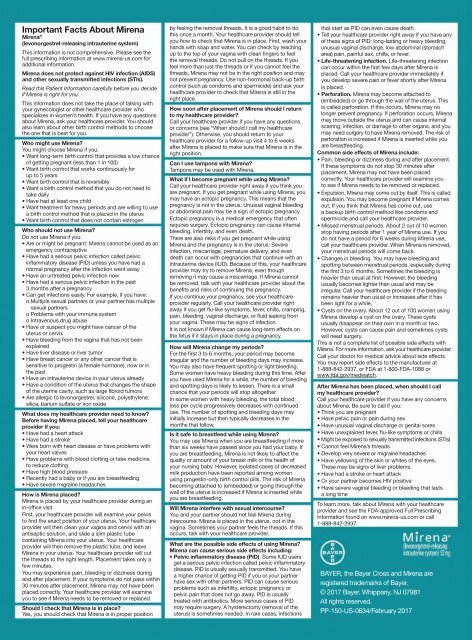In_Touch_Weekly_June_5_2017
Create successful ePaper yourself
Turn your PDF publications into a flip-book with our unique Google optimized e-Paper software.
Important Facts About Mirena<br />
Mirena ®<br />
(levonorgestrel-releasing intrauterine system)<br />
This information is not comprehensive. Please see the<br />
full prescribing information at www.mirena-us.com for<br />
additional information.<br />
Mirena does not protect against HIV infection (AIDS)<br />
and other sexually transmitted infections (STIs).<br />
Read this Patient <strong>In</strong>formation carefully before you decide<br />
if Mirena is right for you.<br />
This information does not take the place of talking with<br />
your gynecologist or other healthcare provider who<br />
specializes in women’s health. If you have any questions<br />
about Mirena, ask your healthcare provider. You should<br />
also learn about other birth control methods to choose<br />
the one that is best for you.<br />
Who might use Mirena?<br />
You might choose Mirena if you:<br />
• Want long-term birth control that provides a low chance<br />
of getting pregnant (less than 1 in 100)<br />
• Want birth control that works continuously for<br />
up to 5 years<br />
• Want birth control that is reversible<br />
• Want a birth control method that you do not need to<br />
take daily<br />
• Have had at least one child<br />
• Want treatment for heavy periods and are willing to use<br />
a birth control method that is placed in the uterus<br />
• Want birth control that does not contain estrogen<br />
Who should not use Mirena?<br />
Do not use Mirena if you:<br />
• Are or might be pregnant; Mirena cannot be used as an<br />
emergency contraceptive<br />
• Have had a serious pelvic infection called pelvic<br />
inflammatory disease (PID) unless you have had a<br />
normal pregnancy after the infection went away<br />
• Have an untreated pelvic infection now<br />
• Have had a serious pelvic infection in the past<br />
3 months after a pregnancy<br />
• Can get infections easily. For example, if you have:<br />
o Multiple sexual partners or your partner has multiple<br />
sexual partners<br />
o Problems with your immune system<br />
o <strong>In</strong>travenous drug abuse<br />
• Have or suspect you might have cancer of the<br />
uterus or cervix<br />
• Have bleeding from the vagina that has not been<br />
explained<br />
• Have liver disease or liver tumor<br />
• Have breast cancer or any other cancer that is<br />
sensitive to progestin (a female hormone), now or in<br />
the past<br />
• Have an intrauterine device in your uterus already<br />
• Have a condition of the uterus that changes the shape<br />
of the uterine cavity, such as large fibroid tumors<br />
• Are allergic to levonorgestrel, silicone, polyethylene,<br />
silica, barium sulfate or iron oxide<br />
What does my healthcare provider need to know?<br />
Before having Mirena placed, tell your healthcare<br />
provider if you:<br />
• Have had a heart attack<br />
• Have had a stroke<br />
• Were born with heart disease or have problems with<br />
your heart valves<br />
• Have problems with blood clotting or take medicine<br />
to reduce clotting<br />
• Have high blood pressure<br />
• Recently had a baby or if you are breastfeeding<br />
• Have severe migraine headaches<br />
How is Mirena placed?<br />
Mirena is placed by your healthcare provider during an<br />
in-office visit.<br />
First, your healthcare provider will examine your pelvis<br />
to find the exact position of your uterus. Your healthcare<br />
provider will then clean your vagina and cervix with an<br />
antiseptic solution, and slide a slim plastic tube<br />
containing Mirena into your uterus. Your healthcare<br />
provider will then remove the plastic tube, and leave<br />
Mirena in your uterus. Your healthcare provider will cut<br />
the threads to the right length. Placement takes only a<br />
few minutes.<br />
You may experience pain, bleeding or dizziness during<br />
and after placement. If your symptoms do not pass within<br />
30 minutes after placement, Mirena may not have been<br />
placed correctly. Your healthcare provider will examine<br />
you to see if Mirena needs to be removed or replaced.<br />
Should I check that Mirena is in place?<br />
Yes, you should check that Mirena is in proper position<br />
by feeling the removal threads. It is a good habit to do<br />
this once a month. Your healthcare provider should tell<br />
you how to check that Mirena is in place. First, wash your<br />
hands with soap and water. You can check by reaching<br />
up to the top of your vagina with clean fingers to feel<br />
the removal threads. Do not pull on the threads. If you<br />
feel more than just the threads or if you cannot feel the<br />
threads, Mirena may not be in the right position and may<br />
not prevent pregnancy. Use non-hormonal back-up birth<br />
control (such as condoms and spermicide) and ask your<br />
healthcare provider to check that Mirena is still in the<br />
right place.<br />
How soon after placement of Mirena should I return<br />
to my healthcare provider?<br />
Call your healthcare provider if you have any questions<br />
or concerns (see “When should I call my healthcare<br />
provider”). Otherwise, you should return to your<br />
healthcare provider for a follow-up visit 4 to 6 weeks<br />
after Mirena is placed to make sure that Mirena is in the<br />
right position.<br />
Can I use tampons with Mirena?<br />
Tampons may be used with Mirena.<br />
What if I become pregnant while using Mirena?<br />
Call your healthcare provider right away if you think you<br />
are pregnant. If you get pregnant while using Mirena, you<br />
may have an ectopic pregnancy. This means that the<br />
pregnancy is not in the uterus. Unusual vaginal bleeding<br />
or abdominal pain may be a sign of ectopic pregnancy.<br />
Ectopic pregnancy is a medical emergency that often<br />
requires surgery. Ectopic pregnancy can cause internal<br />
bleeding, infertility, and even death.<br />
There are also risks if you get pregnant while using<br />
Mirena and the pregnancy is in the uterus. Severe<br />
infection, miscarriage, premature delivery, and even<br />
death can occur with pregnancies that continue with an<br />
intrauterine device (IUD). Because of this, your healthcare<br />
provider may try to remove Mirena, even though<br />
removing it may cause a miscarriage. If Mirena cannot<br />
be removed, talk with your healthcare provider about the<br />
benefits and risks of continuing the pregnancy.<br />
If you continue your pregnancy, see your healthcare<br />
provider regularly. Call your healthcare provider right<br />
away if you get flu-like symptoms, fever, chills, cramping,<br />
pain, bleeding, vaginal discharge, or fluid leaking from<br />
your vagina. These may be signs of infection.<br />
It is not known if Mirena can cause long-term effects on<br />
the fetus if it stays in place during a pregnancy.<br />
How will Mirena change my periods?<br />
For the first 3 to 6 months, your period may become<br />
irregular and the number of bleeding days may increase.<br />
You may also have frequent spotting or light bleeding.<br />
Some women have heavy bleeding during this time. After<br />
you have used Mirena for a while, the number of bleeding<br />
and spotting days is likely to lessen. There is a small<br />
chance that your periods will stop altogether.<br />
<strong>In</strong> some women with heavy bleeding, the total blood<br />
loss per cycle progressively decreases with continued<br />
use. The number of spotting and bleeding days may<br />
initially increase but then typically decreases in the<br />
months that follow.<br />
Is it safe to breastfeed while using Mirena?<br />
You may use Mirena when you are breastfeeding if more<br />
than six weeks have passed since you had your baby. If<br />
you are breastfeeding, Mirena is not likely to affect the<br />
quality or amount of your breast milk or the health of<br />
your nursing baby. However, isolated cases of decreased<br />
milk production have been reported among women<br />
using progestin-only birth control pills. The risk of Mirena<br />
becoming attached to (embedded) or going through the<br />
wall of the uterus is increased if Mirena is inserted while<br />
you are breastfeeding.<br />
Will Mirena interfere with sexual intercourse?<br />
You and your partner should not feel Mirena during<br />
intercourse. Mirena is placed in the uterus, not in the<br />
vagina. Sometimes your partner feels the threads. If this<br />
occurs, talk with your healthcare provider.<br />
What are the possible side effects of using Mirena?<br />
Mirena can cause serious side effects including:<br />
• Pelvic inflammatory disease (PID). Some IUD users<br />
get a serious pelvic infection called pelvic inflammatory<br />
disease. PID is usually sexually transmitted. You have<br />
a higher chance of getting PID if you or your partner<br />
have sex with other partners. PID can cause serious<br />
problems such as infertility, ectopic pregnancy or<br />
pelvic pain that does not go away. PID is usually<br />
treated with antibiotics. More serious cases of PID<br />
may require surgery. A hysterectomy (removal of the<br />
uterus) is sometimes needed. <strong>In</strong> rare cases, infections<br />
that start as PID can even cause death.<br />
• Tell your healthcare provider right away if you have any<br />
of these signs of PID: long-lasting or heavy bleeding,<br />
unusual vaginal discharge, low abdominal (stomach<br />
area) pain, painful sex, chills, or fever.<br />
• Life-threatening infection. Life-threatening infection<br />
can occur within the first few days after Mirena is<br />
placed. Call your healthcare provider immediately if<br />
you develop severe pain or fever shortly after Mirena<br />
is placed.<br />
• Perforation. Mirena may become attached to<br />
(embedded) or go through the wall of the uterus. This<br />
is called perforation. If this occurs, Mirena may no<br />
longer prevent pregnancy. If perforation occurs, Mirena<br />
may move outside the uterus and can cause internal<br />
scarring, infection, or damage to other organs, and you<br />
may need surgery to have Mirena removed. The risk of<br />
perforation is increased if Mirena is inserted while you<br />
are breastfeeding.<br />
Common side effects of Mirena include:<br />
• Pain, bleeding or dizziness during and after placement.<br />
If these symptoms do not stop 30 minutes after<br />
placement, Mirena may not have been placed<br />
correctly. Your healthcare provider will examine you<br />
to see if Mirena needs to be removed or replaced.<br />
• Expulsion. Mirena may come out by itself. This is called<br />
expulsion. You may become pregnant if Mirena comes<br />
out. If you think that Mirena has come out, use<br />
a backup birth control method like condoms and<br />
spermicide and call your healthcare provider.<br />
• Missed menstrual periods. About 2 out of 10 women<br />
stop having periods after 1 year of Mirena use. If you<br />
do not have a period for 6 weeks during Mirena use,<br />
call your healthcare provider. When Mirena is removed,<br />
your menstrual periods will come back.<br />
• Changes in bleeding. You may have bleeding and<br />
spotting between menstrual periods, especially during<br />
the first 3 to 6 months. Sometimes the bleeding is<br />
heavier than usual at first. However, the bleeding<br />
usually becomes lighter than usual and may be<br />
irregular. Call your healthcare provider if the bleeding<br />
remains heavier than usual or increases after it has<br />
been light for a while.<br />
• Cysts on the ovary. About 12 out of 100 women using<br />
Mirena develop a cyst on the ovary. These cysts<br />
usually disappear on their own in a month or two.<br />
However, cysts can cause pain and sometimes cysts<br />
will need surgery.<br />
This is not a complete list of possible side effects with<br />
Mirena. For more information, ask your healthcare provider.<br />
Call your doctor for medical advice about side effects.<br />
You may report side effects to the manufacturer at<br />
1-888-842-2937, or FDA at 1-800-FDA-1088 or<br />
www.fda.gov/medwatch.<br />
After Mirena has been placed, when should I call<br />
my healthcare provider?<br />
Call your healthcare provider if you have any concerns<br />
about Mirena. Be sure to call if you:<br />
• Think you are pregnant<br />
• Have pelvic pain or pain during sex<br />
• Have unusual vaginal discharge or genital sores<br />
• Have unexplained fever, flu-like symptoms or chills<br />
• Might be exposed to sexually transmitted infections (STIs)<br />
• Cannot feel Mirena’s threads<br />
• Develop very severe or migraine headaches<br />
• Have yellowing of the skin or whites of the eyes.<br />
These may be signs of liver problems.<br />
• Have had a stroke or heart attack<br />
• Or your partner becomes HIV positive<br />
• Have severe vaginal bleeding or bleeding that lasts<br />
a long time<br />
To learn more, talk about Mirena with your healthcare<br />
provider and see the FDA-approved Full Prescribing<br />
<strong>In</strong>formation found on www.mirena-us.com or call<br />
1-888-842-2937.<br />
BAYER, the Bayer Cross and Mirena are<br />
registered trademarks of Bayer.<br />
© <strong>2017</strong> Bayer. Whippany, NJ 07981<br />
All rights reserved.<br />
PP-150-US-0634/February <strong>2017</strong>


















